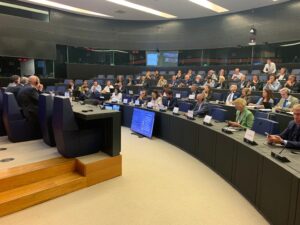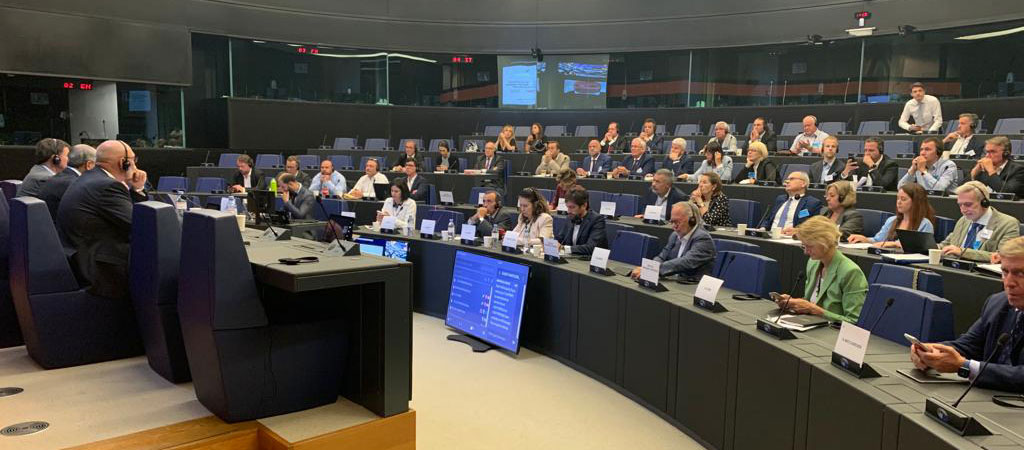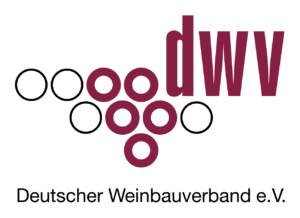Strasbourg, 5 July 2022.
EFOW (the European Federation of Origin Wines) and DWV (the German Winegrowers’ Association) together with MEPs Paolo De Castro (S&D), Alvaro Amaro (EPP), Irène Tolleret (RE), Adrian Vazquez Lazara (RE) and Claude Gruffat (Greens) organised a seminar in Strasbourg to exchange on the revision of Geographical Indications (GI). On that occasion, Arcadia International experts presented to participants EFOW and DWV’s study on sustainability in wine appellations (annexes).

Over 23 wine appellations, representing the wine appellations from France, Germany, Italy, Portugal and Spain, – Alsace, Asti, Baden, Bordeaux, Bourgogne, Champagne, Conegliano Valdobbiadene, Cognac, Douro, Franciacorta, Mittelrhein, Mosel, Prosecco, Pfalz, Port, Rheinhessen, Rías Baixas, Rioja, Vinos de Madrid, Vino Nobile di Montepulciano, Vins doux naturels du Roussillon, Sachsen and Württemberg – travelled to Strasbourg to take part to the event and present to MEPs the successes and the challenges of the wine appellations system.
Arcadia International experts presented a study on the state of play of sustainability initiatives in the wine appellation sector in France, Germany, Italy, Portugal and Spain that they conducted on behalf of EFOW and DWV. The research gathered evidence as to where the sector stands in terms of sustainability and provided insights and recommendations on potential future approaches. The study highlights how wine appellations are in the front line of the ongoing ecological transition, as their production is rooted in specific areas and they will not be able to relocate elsewhere. Moreover, it stresses how appellation wine groups by their economic relevance, collective approach and presence on the territory should be seen by public authorities as strategic partners that need to be in included in the design and implementation of policy actions in sustainability and used as levers of change.
Further to the publication of the EC proposal on the review of the GI policy, the future management of the GI system and the specificities of the wine sector were also at the heart of the debates between the sector and MEPs.
EFOW’s President, Mr. Bernard Farges, explains: “Our local products have become symbols of the European quality and food know-how on the world stage. The objective of this new reform must be to strengthen the system of appellations, not to weaken it. To do so, appellations must not be seen as a mere intellectual property right and the EU quality policy the mere protection of a name. It must be recalled that this system is an integral part of the European agricultural policy. GIs help to create value, ensure better remuneration for producers, and make a major contribution to the rural development of European territories. The EC, and more specifically DG Agriculture, must remain at the heart of the management of our specifications. To enable it to work better and to fulfil this mission we must consider ways to reduce its workload. This is possible by introducing more subsidiarity in the management of our product specifications.”
DWV’s President, Mr. Klaus Schneider, stresses: “The EU is today the world’s leading producer of wine. Unlike other sectors, the European wine sector is composed in majority of products under a GI. Without wine appellations one could say that there is no European viticulture. The rules and specificities of wine sector are set out in the CMO Regulation: provisions on labelling, market measures, competition rules, vine planting authorisations, oenological practices, traditional terms. This is why we oppose detaching the GI wine rules from the CAP, as this would complexify the system. Moreover, there will no longer be a parallel reform of viticulture and its’ GI policy, something which has proven to be very useful up to now.”



